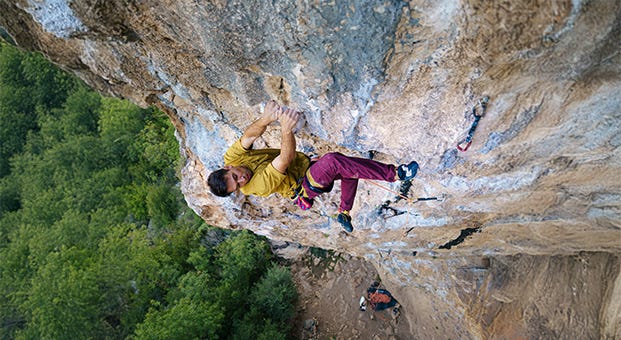Your cart

SS25 NEW IN →
Words often make the difference, and Adam Ondra knows this. The Czech champion, winner this year at Rock Master and protagonist of the last episode of the Strange Heroes series, reveals to us his training secrets, and that in the end, the important thing is always to have fun.

I have always considered my training to be very important and I have always put a lot of emphasis on the tiniest details to improve even more. But what always has to be there in the first place is passion. The only purpose of training is not just getting better and stronger. The goal should be the training itself. It can be very fun.
Let’s start with the word training itself. For most people, it just sounds like something hard that you have to do. Something for what you must sacrifice a lot of time and go through a lot of pain. In short, something that is not primarily about fun but about working hard for some positive benefits. But most people who climb really like climbing, right? Because if they didn't, why would they climb in the first place?
As training for climbing should most of all consist of climbing itself, you should like it as well. So, from the early childhood, instead of saying I’m going training, I always said I’m going climbing. Which means I’m going to have some fun. This "fun attitude" does not mean that you do not train hard. You might actually train even harder but it helps you to enjoy it, and most importantly, you are much more likely to learn new things. And that is after all what makes you a better climber, not just a stronger climber.
My own training nowadays, in cooperation with Patxi Usobiaga, takes about 4 or 5 hours a day, 6 days a week. Approximately 70 % of it is climbing itself, the rest is campus board and physical compensation exercises. Stretching is not included in this time but it is also very important. Usually, I do campusing in the morning, then bouldering and power endurance (on rope or climbing circuits) in the afternoon. All parts are very important and none of my session is always the same. I need to follow a systematic schedule to some degree, and to improvise at the same time. In bouldering, it is the freest as it is simply about figuring out the craziest moves, learning new movement patterns, sometimes with a training partner as well. In power endurance, I have a certain number of routes and minutes of rest, but then I just choose the circuits or routes as I go. To keep it fun.
But to be honest, I must admit that event with this “fun attitude” I’m not 100 % psyched every single time, sometimes I feel tired. But it is about playing the game with my mind, trying to convince it that despite the fatigue, as soon as I start climbing, it will be fun, and I will enjoy it. It is about turning pain into joy. And that is what every good climber should be good at. It takes a lot of mental power, but it is possible. Suffering throughout training sessions is possible but forgetting about the pain and climbing with all the passion you have, that is what it really takes to be a champion.
Our catalogue and services may vary depending on location.
Remember that we can ship only to addresses located in the selected country.
By changing locations, the content of your shopping cart and wishlist will be updated.